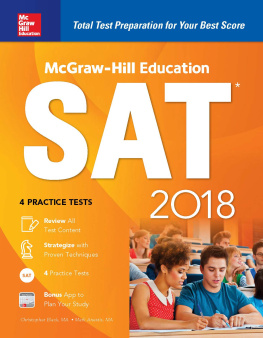McGRAW-HILLs CONQUERING SAT WRITING
McGRAW-HILLs CONQUERING SAT WRITING
Second Edition
Christopher Black
College Hill Coaching


Copyright 2011, by Christopher Black. All rights reserved. Except as permitted under the United States Copyright Act of 1976, no part of this publication may be reproduced or distributed in any form or by any means, or stored in a database or retrieval system, without the prior written permission of the publisher.
ISBN: 978-0-07-174914-5
MHID: 0-07-174914-4
The material in this eBook also appears in the print version of this title: ISBN: 978-0-07-174913-8, MHID: 0-07-174913-6.
All trademarks are trademarks of their respective owners. Rather than put a trademark symbol after every occurrence of a trademarked name, we use names in an editorial fashion only, and to the benefit of the trademark owner, with no intention of infringement of the trademark. Where such designations appear in this book, they have been printed with initial caps.
McGraw-Hill eBooks are available at special quantity discounts to use as premiums and sales promotions, or for use in corporate training programs. To contact a representative please e-mail us at bulksales@mcgraw-hill.com.
TERMS OF USE
This is a copyrighted work and The McGraw-Hill Companies, Inc. (McGraw-Hill) and its licensors reserve all rights in and to the work. Use of this work is subject to these terms. Except as permitted under the Copyright Act of 1976 and the right to store and retrieve one copy of the work, you may not decompile, disassemble, reverse engineer, reproduce, modify, create derivative works based upon, transmit, distribute, disseminate, sell, publish or sublicense the work or any part of it without McGraw-Hills prior consent. You may use the work for your own noncommercial and personal use; any other use of the work is strictly prohibited. Your right to use the work may be terminated if you fail to comply with these terms.
THE WORK IS PROVIDED AS IS. McGRAW-HILL AND ITS LICENSORS MAKE NO GUARANTEES OR WARRANTIES AS TO THE ACCURACY, ADEQUACY OR COMPLETENESS OF OR RESULTS TO BE OBTAINED FROM USING THE WORK, INCLUDING ANY INFORMATION THAT CAN BE ACCESSED THROUGH THE WORK VIA HYPERLINK OR OTHERWISE, AND EXPRESSLY DISCLAIM ANY WARRANTY, EXPRESS OR IMPLIED, INCLUDING BUT NOT LIMITED TO IMPLIED WARRANTIES OF MERCHANTABILITY OR FITNESS FOR A PARTICULAR PURPOSE. McGraw-Hill and its licensors do not warrant or guarantee that the functions contained in the work will meet your requirements or that its operation will be uninterrupted or error free. Neither McGraw-Hill nor its licensors shall be liable to you or anyone else for any inaccuracy, error or omission, regardless of cause, in the work or for any damages resulting there from. McGraw-Hill has no responsibility for the content of any information accessed through the work. Under no circumstances shall McGraw-Hill and/or its licensors be liable for any indirect, incidental, special, punitive, consequential or similar damages that result from the use of or inability to use the work, even if any of them has been advised of the possibility of such damages. This limitation of liability shall apply to any claim or cause whatsoever whether such claim or cause arises in contract, tort or otherwise.
Contents
About the College Hill Method
Much of the material in this book is based on the College Hill Method, which I have been using with my students for 15 years. It focuses on developing reasoning skills, and so provides a sound basis for preparing for reasoning tests like the SAT. It is based on seven principles.
1. Good students work to understand how their minds work. For instance, you should know that your brain has evolved to solve some problems naturally, but not others. We learn to speak and to gesture without being taught, but we cant learn to write essays without instruction. This is because speaking and gesturing helped our ancestors to survive and reproduce, but writing did not. Therefore, there is no natural way to write. It is an unnatural process that requires us to think differently than we do when we are simply talking.
2. Good students work to improve their reasoning skills. We use many different reasoning skills to solve tough problems, and all of them can be improved with practice, just as a baseball players skills can be improved with practice. These reasoning skills include the ability to conceptualize problems, to analyze problems, to find patterns, to manipulate mental images, to simplify problems, to recall information, and to use logic. Good students work to improve these skills, and pay attention to how they are used in solving tough problems. To become a good writer, for instance, you must learn to analyze your audience, your task, your essay, your paragraphs, your sentences, your clauses, your phrases, and your words. These are not natural skills, so they require focused practice.
3. Good students focus on the questions that concern the disciplinary experts. In school, its easy to get caught up in the task of getting good grades and lose track of the questions that concern the real disciplinary experts. A good student should not merely be interested in getting a good SAT Writing score, but also with solving the problems that a good writer must solve, like How do I write something that is worthwhile? How do I convince an antagonistic audience? How do I keep their attention? and How do I analyze a difficult topic?
4. Good students build disciplinary understanding through mental models. A mental model is a set of interrelated concepts that work together like a mechanical device in your mind. You can manipulate these concepts to test hypotheses and make deductions. For instance, the balanced scale concept helps students to understand how to manipulate equations in a logical way. A good writer understands the craft of writing with mental models also. For instance, writers tend to conceptualize paragraphs as stepping stones on a journey, and examples and reasoning as the foundation of a building.
5. Good students break bad thinking habits. The bad habits we develop as writers usually come from our habits as speakers. A good writer understands the difference between having a casual conversation and writing a formal essay. Different assumptions must be made, and different rules must be followed.
6. Good students constantly seek new challenges. Life will present you with many opportunities to take the easy way out. If you want to be happy with yourself, avoid them. Youre on the right track because youve chosen to prepare for the SAT Writing with the method that works best, even though its not the easiest.
7. Good students work to make the world better. Okay, so getting a 750 on your SAT Writing wont really make the world better. But the skills you develop in getting it just might, if you put them to good use.
Ill try my best not to hit you over the head with these principles as we work together. Ill try to work them in only as necessary. It might benefit you, however, to think of these principles as you go about your business of being a student.
Acknowledgments
Deepest thanks to Elizabeth, Sarah, and Anna for their love and support and to my students at College Hill Coaching for their inspiration and hard work. Special thanks to Jennie Nevin for her energy and inspired words.
Next page





